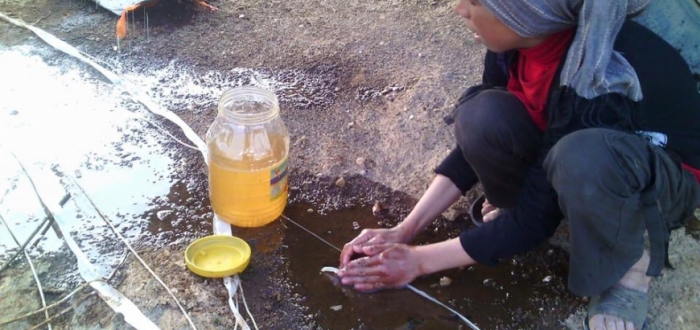Sources inside besieged areas of Deir-ez-Zor told Al-Souria Net that five of the food rations airdropped on Sunday were seized by regime forces, while three of the drops fell on the eastern section of the city controlled by the Islamic State (ISIS) and were seized by its fighters. Regime forces gave the remaining aid to the Syrian Red Crescent, amounting to about 17 drops.
The source said that some of this aid was sold in the city’s markets, namely the Wadi Street market, by traders who are known to collaborate with regime forces in the area. These traders have previously purchased aid dropped by Russian airplanes from the regime, which seizes most of it, and proceeded to sell it at higher prices. Very little of this aid has been distributed through the Red Crescent, only enough for a small number of residents.
The source said that the branch of the Red Crescent is typically forced to distribute some of what remains of the aid to individuals in the regime forces and allied militias, as well as militias of the “Jaish al-Ashair,” in addition to civilians. He noted that at the same time the Red Crescent in Deir-ez-Zor, which is subjected to pressure from regime military leaders in the city, proceeds to give false information regarding the distribution of rations to displaced residents. Recently, residents of the besieged Cinema Fouad Street were forced to divide one food ration between two families, contradicting statements by officials claiming to have distributed one ration to each family.
Al-Souria Net communicated with local residents inside the the Joura and Qasour districts who confirmed the presence of some of the materials that fell in the markets, where vendors in the area openly buy aid from traders working with the regime.
Saher “Abu Ibrahim,” a resident of the Qasour area of Deir-ez-Zor, said that he went to the Red Crescent branch in the city to ask about the aid, but was told that what had reached them would only be distributed to the residents of one of the besieged areas, as it was impossible to cover the needs of all residents throughout the city.
He added that the prices in the markets have recently declined slightly, because traders generally bring out some of what they have of stored goods as well as items from the aid, so the supply of some items increases over two or three days.
The World Food Program said that it had succeeded on Sunday in airdropping food aid to the besieged regions of Deir-ez-Zor, after the failure of its first attempt in February.
This article was translated and edited by The Syrian Observer. Responsibility for the information and views set out in this article lies entirely with the author.


